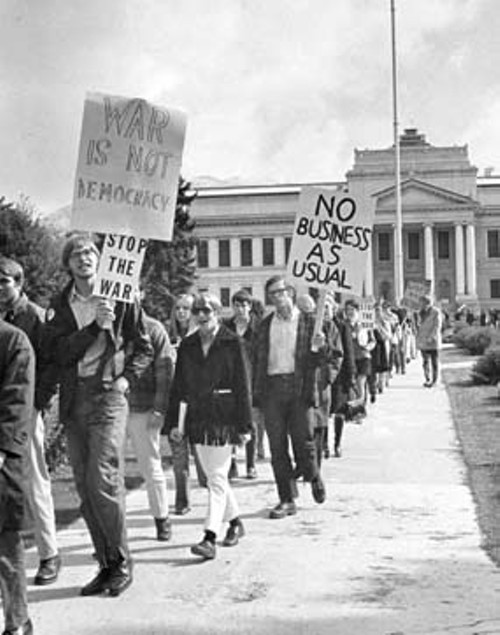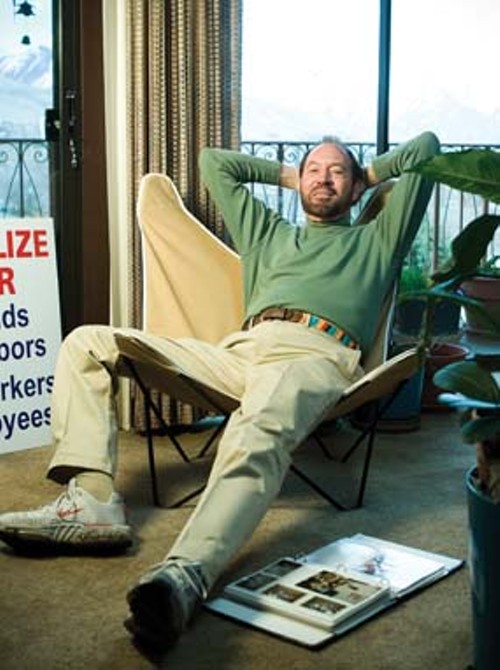Feature | We Don’t Want your F*#king War: Had enough? Sixties throwback Students for a Democratic Society returns to campus
By Lisa SorgPage 3 of 3
Political activism rarely raises to more than a low simmer these days at the University of Utah, so the image of the campus as a hotbed of protest 40 years ago seems mind-boggling. But it’s true. At the height of the Vietnam War—from approximately 1967 to 1972—students took part in burning their draft cards and between 4,000 and 5,000 of them (depending on the source) rallied on the lawn south of the A. Ray Olpin Union building on May 6, 1970—two days after National Guardsmen shot and killed four Kent State University students during an anti-war demonstration.
And as it was etched in Rampton’s mind (he was governor at the time), students did set fire to a World War II-era building that had long been vacant and slated for demolition. But it was the act itself that chapped members of the campus and state establishment.
“Those who chose to burn [the building] down knew there was no one inside,” Holbrook recalls. On the same day, about 800 students marched into the Park Building (the administration building) and sat down. Many of them left when informed they would be suspended from school, but a committed core stayed overnight. They were arrested the following day.
But Holbrook had been arrested years earlier. He takes a certain pride that he stood against the Vietnam War long before the protest movement took hold on campuses nationwide. “In 1964, eight of us went to the downtown post office. We were the ‘Induction Committee.’ They burned their Selective Service cards and were arrested at the door.
The college years proved a fascinating evolution for Holbrook, who grew up in a conservative family in Bountiful. He was steeped in Republican politics, once met President Dwight D. Eisenhower and attended the 1960 Republican National Convention, which nominated Richard Nixon to run against John F. Kennedy.
By 1963, having witnessed a march in Washington, D.C., memorializing slain civil rights worker Medgar Evers, Holbrook began to change his views. “In time, I realized how out-of-touch the powers that be were in regard to both the war and the civil rights movement,” he says.
In that way, he was much like millions of other ’60s-era college students. They had grown up steeped in the notion that America was the land of opportunity for all, and that political leaders could be trusted to make the right decisions. “And by the time the moratoriums of 1968 and ‘69 caught on, thousands of people at a time were getting involved,” Holbrook says. Dogs and fire hoses were being turned on black people in the South; the poor and undereducated were being drafted for Vietnam with no access to the deferments enjoyed by the wealthy.
“There was an obvious disconnect between what we say we are as a nation and who we really are. And we came to know that,” Holbrook says.
With a handful of modern SDS chapters springing up around the country, so far the U remains mostly uninvolved in any solid anti-Iraq War effort. Dustin Gardiner, a U senior who takes over the editorship of the Daily Utah Chronicle in May, believes the only way to shake up students is by reinstating the draft.
“I’m sure if more people had a personal stake in the war, we’d see more
activism,” Gardiner says. There are, he says, random student-led causes scattered around the campus. Many of them pop up in specific colleges and among extracurricular groups. A group known as Sustainable Environments and Ecological Design (SEED) is leading the charge and pushed for the recent establishment of a campus “sustainability office.”Beyond campus life, of course, there are committed peace activists—many of whom took a lesson from ‘60s protesters. Diana Lee Hirschi is a Salt Lake City Quaker and longtime pacifist. She participated in an April 5 anti-war protest downtown, one of many simultaneously held across the country.
Americans’ apathy toward an all-out antiwar effort isn’t exactly a mystery to her. “The neocons have been in control for too long, and it has been devastating for our democratic rights,” Hirschi says. “The Patriot Act comes to mind, and the concentration of media ownership. People can feel powerless against these things. I mean, how many more articles about piddly-assed shit between Hillary and Obama do we have to read?”
And laying blame strictly on students—charging them with apathy in opposing this war—is a bit harsh, she believes. “I don’t want to put too much pressure on young people in this effort. It’s a huge and horrible regime they’re up against. The current administration has made it clear they aren’t listening and don’t care what we think. It’s easy to get discouraged.
“But being discouraged is one thing. I hope they never get bitter.” —Holly Mullen
Latest in Cover Story
Readers also liked…
-
Forget the family pedigree—Robert F. Kennedy Jr should not be the next president of the United States
Trojan Horse
- Jun 21, 2023
-
Women decry harassment and toxic culture at St. George auto dealership
Men at Work
- Oct 11, 2023





